GCSE results 2024: English and maths pass rate down
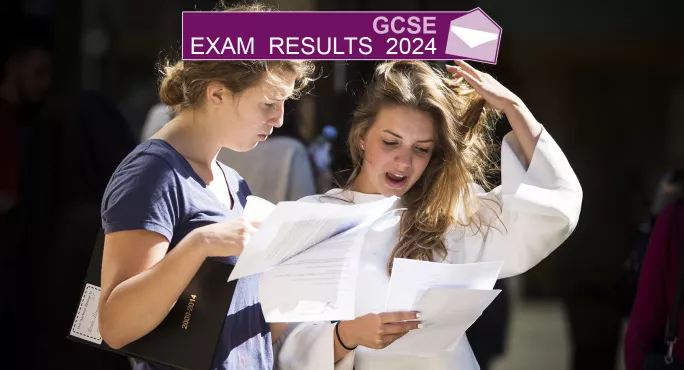
GCSE results have been released today across England, revealing that the percentage of students achieving pass grades in English and maths has fallen compared with last year - and that the gap between top grades achieved in private and state schools has increased.
The results are broadly similar to those of 2023 overall, with similar proportions of both top grades and students achieving a grade 4 or better.
However, there was a marked drop in the pass rate for English language GCSEs, which has mostly been driven by results for candidates aged 17 or over who were resitting the qualification.
Around four in five students aged 17 who took English language failed to achieve a grade 4 or better this year. (You can find our in-depth subject-by-subject breakdown here.)
Speaking in a Joint Council for Qualifications (JCQ) briefing this morning, Claire Thomson, AQA’s director of regulation and compliance, said the drop in pass rates was “largely around the 17-year-olds and over who are skewing the distributions. If you look at just the 16-year-olds, they are very stable with minimal movement over the years.
“The 17-and-over cohort has grown and come back over pre-pandemic levels, which is altering the results.”
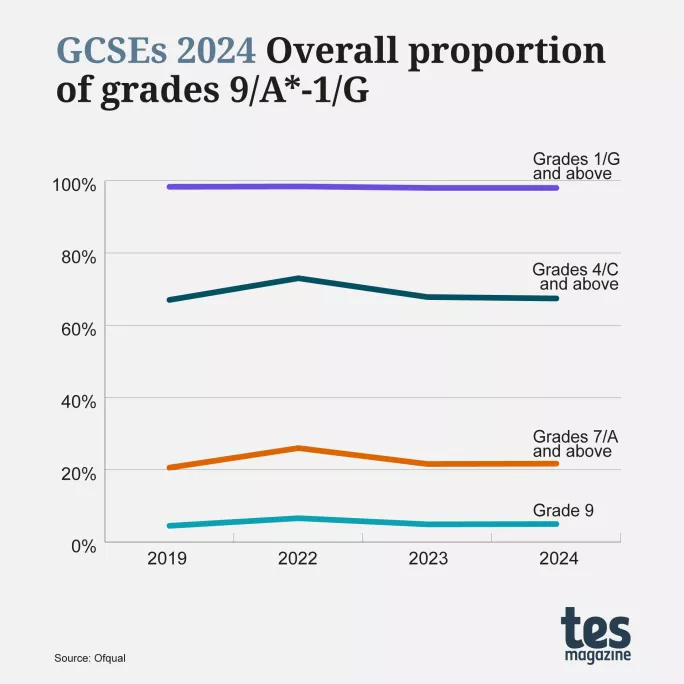
Ofqual told examiners to proceed with “back to normal” grading standards this year after the two-step process to return to pre-pandemic grading was completed last year.
For 2024, examiners were asked to ensure the standard of work was comparable to 2023.
The 2023 GCSE results had seen a fall in the proportion of top grades awarded from 2022, bringing grade distribution more in line with 2019 levels. The proportion of top grades remained slightly above 2019 levels.
This year, examiners were asked by Ofqual to “bear in mind any residual impact of disruption on performance”.
Below are the key takeaways from this year’s GCSE results:
- GCSE grade spread similar to 2023
- English language resit passes down
- Private and state top grades gap increases
- Regions gap remains stable
- Gender gap narrows slightly
- Results in Wales and Northern Ireland
1. Grade spread similar to last year
Overall this year, 67.4 per cent of entries were awarded a grade 4/C or above. This is only slightly lower than last year, when 67.8 per cent of entries received a grade 4 or above.
In 2019, before the Covid-19 pandemic, 67 per cent received a grade 4 or above.
For the higher grades, the overall proportion of entries achieving a grade 7/A or higher was 21.7 per cent. This is very similar to 2023, when it was 21.6 per cent.
And finally, in 2024, a very slightly higher proportion of entries managed to achieve grade 9 (5 per cent). In 2023 and 2019, 4.9 per cent and 4.5 per cent of overall entries got a grade 9 respectively.
2. English language resit passes down
Pass rates for English and maths GCSEs were down on last year. However, this was in part because of a marked drop in the number of students aged 17 or over who did achieve a grade 4 in English language.
Overall in English language, 61.6 per cent achieved a grade 4/C or higher, compared with 64.2 per cent in 2023 and 61.8 per cent in 2019.
The pass rate in English language for candidates who were 17 or older was 20.9 per cent this year in England - down from 25.9 per cent last year.
The results only for 16-year-old candidates saw 71.2 per cent of entries awarded grade 4 or above - very slightly down from 71.6 per cent last year.
The percentage of students achieving the grade they need to pass in maths (4) has fallen this year to 59.6 per cent. Last year, 61 per cent of students achieved grade 4 in maths.
The results for 16-year-old entries show that 72 per cent of students achieved grade 4 in maths this year, slightly down from 72.3 per cent last year.
For entries among students who are aged 17 or over, 17.4 per cent of entries achieved grade 4 or above - up from 16.4 per cent last year.
Overall, 40.4 per cent of entries failed to achieve grade 4 in maths, and 38.4 per cent in English language.
In English literature, 73.7 per cent of entries received a grade 4 or above, very slightly down from 73.9 per cent last year. However, this was still slightly above the last set of pre-pandemic results, as 73.4 per cent passed in 2019.
Last summer’s GCSE results saw an increase in the number of students failing to achieve a pass mark for English and maths, and therefore an increase in those having to resit in November.
However, less than a quarter of the students who took GCSE maths in November 2023 passed - meaning the majority failed their resits.
Leaders across the sector have called for reform to the GCSE resit system, as many students currently never pass. Earlier this week, Professor Alan Smithers, director of the Centre for Education and Employment Research at the University of Buckingham, said that the current system is “soul-destroying”, and called on the government to make a change.
Paul Whiteman, general secretary of the NAHT school leaders’ union, said that the current GCSE resit policy for English and maths “must be scrapped”.
“Those students who haven’t achieved the required grade are forced into repeated resits that are demotivating and can lead to disengagement with their learning,” he said.
Instead, Mr Whiteman said alternative qualifications in maths and English would be a more positive way for some students to demonstrate their achievements.
3. Private and state top grades gap increases
This year has also seen the gap between entries from academies and independent schools grow for achieving the top grades. Nearly half of entries from private schools achieved a grade 7/A or above (48.4 per cent), compared with 21.2 per cent of academies - a 27.2 percentage point gap.
Last year, there was a 26.5 percentage point gap between the proportion of entries from academies (21 per cent) and entries from independent schools (47.5 per cent) being awarded a grade 7 or above.
At secondary comprehensives, 19.4 per cent of entries achieved the top grades.
Statistics for independent schools also include city training colleges.
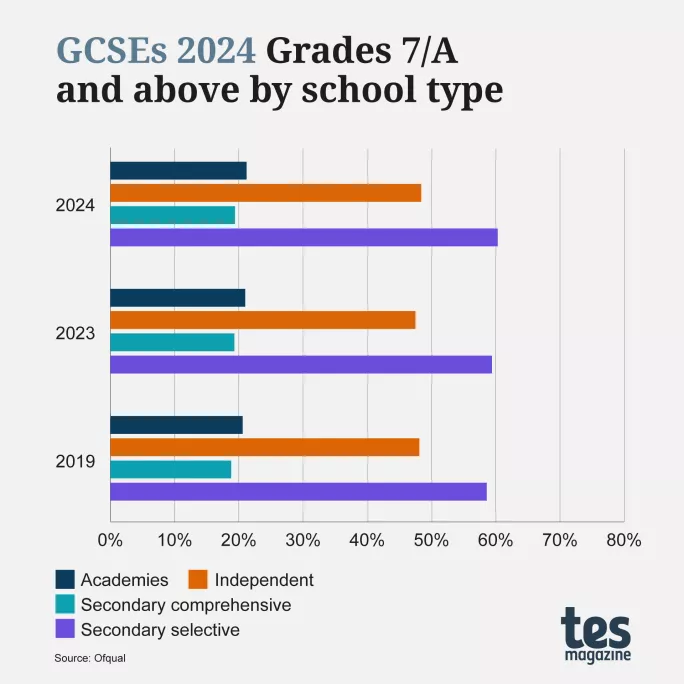
There was a slightly larger gap in 2023 between secondary comprehensive entries hitting the top grades (19.3 per cent) and independent schools of 28.2 percentage points.
However, the gap between school types was slightly lower in 2024 than in 2019, when there was a 27.5 percentage point between academies and independent schools and a 29.3 percentage point gap between comprehensive and private schools.
Schools minister Catherine McKinnell congratulated students and teachers on their achievements today but added: “While this is a moment to celebrate, I am deeply concerned about the inequalities in our education system with where you live and what type of school you attend still being too big an influence on your opportunities.”
4. Regions gap remains stable
The attainment gap between the North and South of England has also remained very similar to last year in terms of top grades.
The proportion of entries achieving a grade 7/A or above was lowest in the North East at 17.8 per cent. This is compared with London, where 28.5 per cent of entries made the grade 7/A.
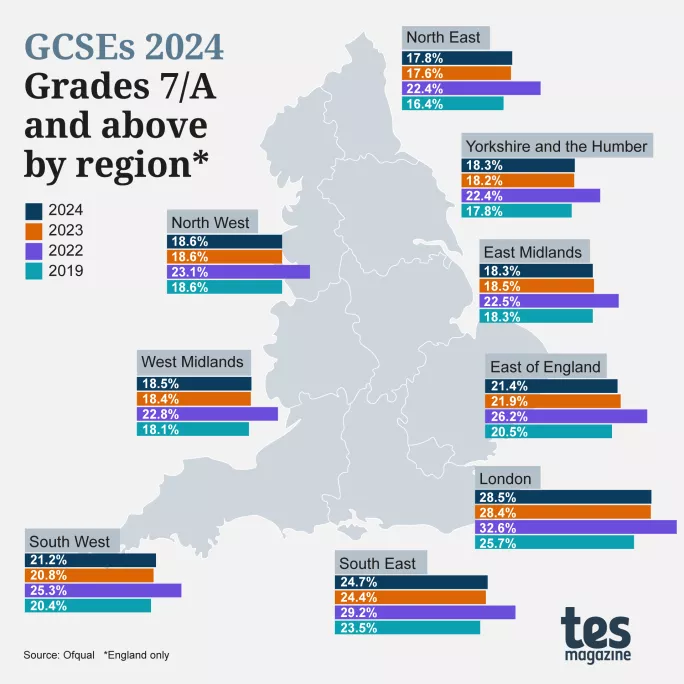
Last year, the North East also saw the lowest proportion of top grades, with 17.6 per cent achieving a grade 7 or above. London remained the highest, with 28.4 per cent of entries being awarded those top grades.
That 10.8 percentage point gap was up from 9.3 percentage points in 2019. It has remained constant this year at 10.7 percentage points.
Senior leaders said earlier this year they were concerned about Year 11 exam readiness as absence remained high this spring term.
Absence has been particularly high among the most disadvantaged students. There is a higher proportion of disadvantaged students in the North.
Last week, education secretary Bridget Phillipson pledged to turn around “baked-in” educational inequalities and accused the previous government of leaving a legacy of regional “disparities” in exam outcomes and an attainment gap between private school students and their peers in state schools.
Pepe Di’Iasio, general secretary of the Association of School and College Leaders, said that the results show “significant differences” in regional outcomes for GCSEs in England.
“This suggests that relative levels of prosperity and socioeconomic disadvantage continue to play a huge part in educational outcomes,” he said. “Addressing these gaps must be a key priority for the new government working alongside the education sector.”
He added that “funding and teacher shortages, combined with post-pandemic issues around mental health, behaviour and attendance, have made circumstances particularly challenging”.
5. Gender gap narrows slightly
For 2024, the gender gap very slightly narrowed with 70.8 per cent of entries from girls achieving a grade 4/C or above compared with 64.1 per cent of boys - a 6.7 percentage point gap.
Last year, 71.3 per cent of all entries from girls achieved a grade 4 or above, compared with 64.4 per cent of entries from boys - a gap of 6.9 percentage points.
This 6.9 percentage point gap was narrower than in 2019, when 71.4 per cent of girls achieved a grade 4 or above compared with 62.7 per cent of boys.
Entries from girls were also more likely to receive top grades, with 24.4 per cent being awarded a grade 7/A, compared with 18.9 per cent of boys this year.
This was a slight narrowing of the gap from last year, when there was a 5.8 percentage point gap between girls and boys getting the top GCSE grades.
Girls continue to get more grade 9s than boys at 5.8 per cent of entries compared with 4.2 per cent.
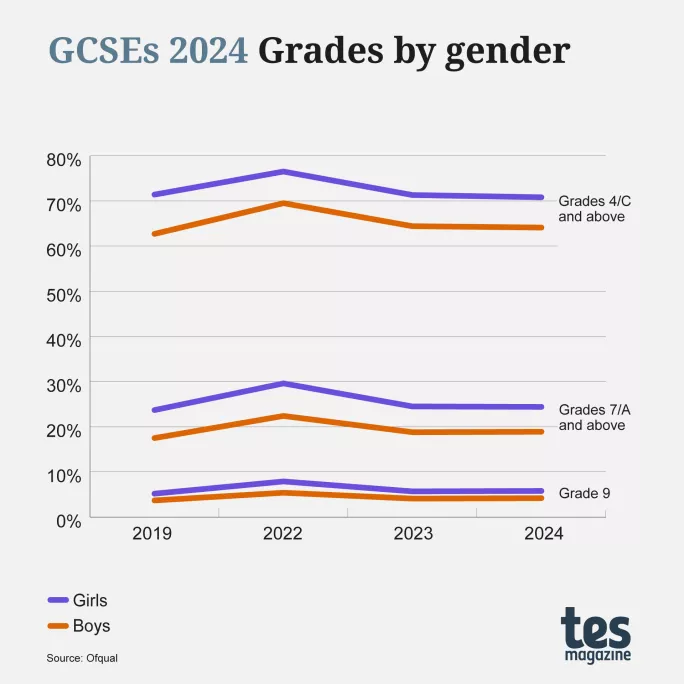
The Education Policy Institute (EPI) highlighted recently that the gender gap that has seen girls generally attain higher for many years has been narrowing since the pandemic.
Up to 2023, this narrowing has not only been driven by some increases in attainment for boys at key stage 4, but also some falls in attainment for girls.
6. Wales and Northern Ireland: slight rise in top grades
In Northern Ireland, 31 per cent of GCSE students achieved a grade A/7 or above in 2024, compared with 30.5 per cent in 2019. Meanwhile, 82.7 per cent of exam entries received a grade C/4 or above, similar to the 82.2 per cent of entries in 2019.
In Wales, 19.2 per cent of students achieved an A/7 or above, compared with 18.4 per cent in 2019. This year, 62.2 per cent of exam entries received a C/4 or above - only slightly lower than the 62.8 per cent of entries that achieved this in 2019.

- GCSE results 2024: how did each subject perform?
- GCSE resits: everything you need to know
- How much does attendance really affect GCSE results?
- Government ‘should rethink soul-destroying resits’
- Concern over exams’ impact on student mental health
For the latest education news and analysis delivered every weekday morning, sign up for the Tes Daily newsletter
topics in this article



